Methods to Access Your Driving Record in Michigan

How to Check Driving Record Michigan: Comprehensive Guide
A Michigan driving record is an official document that provides a detailed history of a driver’s activities and interactions with the Michigan Department of State. It includes key information such as traffic violations, points accrued, suspensions, revocations, and the status of the driver’s license.
For individuals, a driving record serves as a personal log of their driving behavior and history. For employers, it is an essential tool for assessing potential hires for driving-related roles. Insurance companies also rely on driving records to evaluate risk and determine policy rates.
Why Is It Important to Check Your Driving Record in Michigan?
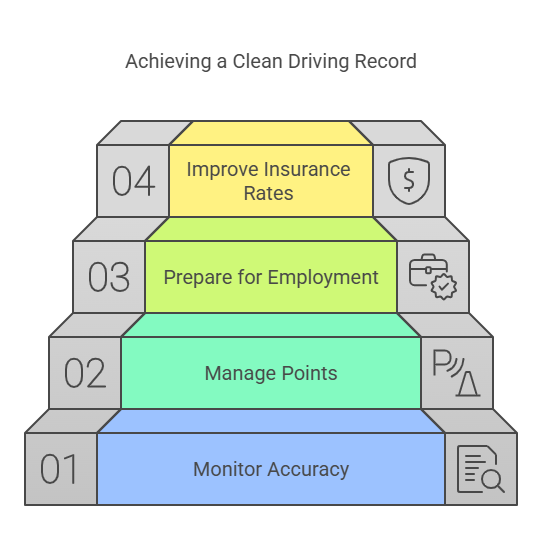
Regularly checking your driving record can help you:
- Monitor Accuracy: Ensure that all details, such as traffic violations and penalties, are accurately recorded.
- Manage Points: Keep track of any accumulated points to avoid license suspensions or other penalties.
- Prepare for Employment: Ensure that potential employers see an accurate and up-to-date record.
- Improve Insurance Rates: A clean driving record can qualify you for lower premiums.
Types of Michigan Driving Records
In Michigan, driving records can be categorized into two main types:
- Basic Driving Record:
- Includes standard information such as points, violations, and license status.
- Useful for personal monitoring or insurance purposes.
- Certified Driving Record:
- An official, authenticated version of your driving record.
- Often required for legal proceedings, job applications, or other formal purposes.
| Type | Details Included | Common Uses |
|---|---|---|
| Basic Record | Points, violations, license status | Personal use, insurance |
| Certified Record | Official, verified details | Court cases, job applications, formal needs |
What Information Is Included in a Michigan Driving Record?
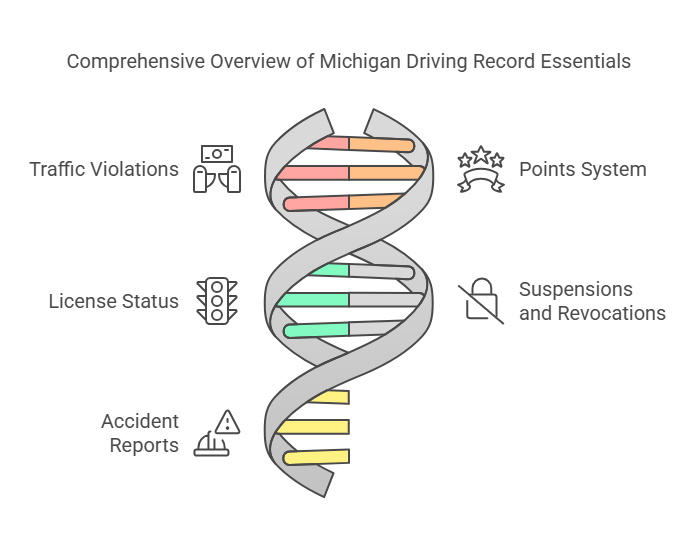
A Michigan driving record provides comprehensive details, including:
- Traffic Violations: Records of speeding tickets, DUIs, or other infractions.
- Points: Michigan assigns points for various traffic violations, which can impact your driving privileges.
- License Status: Indicates whether your license is active, suspended, or revoked.
- Suspensions and Revocations: Details of any penalties affecting your ability to drive legally.
- Accident Reports: Records of any accidents you’ve been involved in (if reported).
How to Check a Driving Record in Michigan
The Michigan Department of State offers multiple methods for individuals and organizations to request and review driving records. Below is a step-by-step guide for each method:
1. Online Request via Michigan Department of State Website
The fastest and most convenient way to check your Michigan driving record is online.
Steps to Request Online:
- Visit the Official Website: Navigate to the Michigan Department of State’s official website.
- Log In or Create an Account: Use your Michigan account credentials or create a new account.
- Select “Driving Record Request”: Choose the appropriate option from the menu.
- Provide Personal Information: Enter details such as your driver’s license number and date of birth.
- Make Payment: Pay the applicable fee (around $11).
- Download and Save: Once processed, you can view and save the driving record.
2. In-Person Request at a Local Secretary of State (SOS) Office
If you prefer a face-to-face approach, you can request your driving record in person.
Steps to Request In-Person:
- Locate an SOS Office: Use the Michigan Department of State website to find a nearby location.
- Bring Identification: Carry your driver’s license or other government-issued ID.
- Fill Out a Request Form: Complete the required form available at the office.
- Pay the Fee: Fees may vary but generally range from $11 to $12.
- Receive Your Record: You’ll receive a printed copy of your driving record on the spot.
3. Request by Mail
For those unable to access online services or visit an SOS office, requesting a driving record by mail is an option.
Steps to Request by Mail:
- Obtain the Request Form: Download the driving record request form (Form BDVR-154) from the Michigan Department of State website.
- Complete the Form: Provide accurate details, including your full name, driver’s license number, and current address.
- Include Payment: Attach a check or money order for the fee.
- Mail the Form: Send the completed form and payment to the address provided on the form.
- Wait for Processing: Allow 2–3 weeks for processing and delivery.
Summary Table: Methods to Check Michigan Driving Records
| Method | Processing Time | Cost | Best For |
|---|---|---|---|
| Online | Immediate | ~$11 | Quick and convenient access |
| In-Person | Same day | ~$12 | Formal and immediate needs |
| By Mail | 2–3 weeks | ~$12 | Those without online access |
Infographic: Michigan Driving Record Request Process
An infographic visually summarizes the three methods to request a Michigan driving record, including key steps and associated costs.
Common Reasons for Checking a Michigan Driving Record
- Personal Monitoring:
- Stay informed about accumulated points and avoid penalties.
- Employment Screening:
- Employers often require driving records for roles involving transportation or vehicle operation.
- Insurance Assessment:
- Insurers use driving records to assess risk and set premiums.
- Legal or Court Requirements:
- Certified records may be needed for legal proceedings or disputes.
By understanding the methods and significance of checking your driving record in Michigan, individuals can ensure accuracy, comply with legal obligations, and maintain their driving privileges.
Benefits and Uses of Checking Driving Records in Michigan
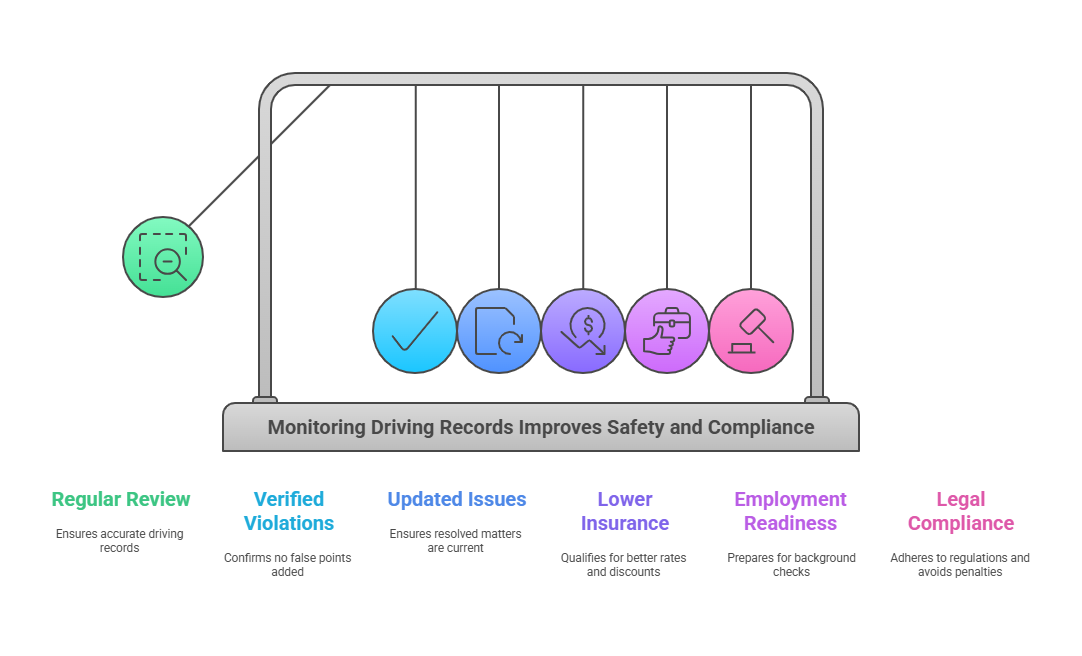
Regularly checking your Michigan driving record can provide numerous benefits, both for individuals and organizations. Whether you’re a driver aiming to maintain a clean history, an employer ensuring compliance, or an insurer assessing risk, accessing accurate driving records is a crucial step. In this section, we explore the key benefits, practical applications, and best practices for using driving records in Michigan.
Benefits of Checking Michigan Driving Records
1. Ensuring Accuracy and Identifying Errors
Mistakes in driving records can occur due to administrative errors, data entry issues, or outdated information. Regularly reviewing your driving record helps:
- Verify that no false violations or points have been added.
- Confirm that resolved issues, such as paid fines or lifted suspensions, are correctly updated.
- Prevent potential disputes with employers or insurance companies.
If inaccuracies are found, drivers can file a request with the Michigan Department of State to correct the record.
2. Monitoring Points to Avoid Penalties
Michigan operates on a points system where certain violations add points to your driving record. Accumulating too many points within a specific timeframe can result in:
- Increased insurance premiums.
- License suspension or revocation.
- Additional penalties, such as mandatory driver improvement courses.
By monitoring points on your record, you can take proactive steps to improve your driving habits and avoid further penalties.
3. Enhancing Employment Opportunities
For job seekers, especially those applying for positions that involve driving (e.g., delivery drivers, commercial truck operators, or rideshare drivers), a clean driving record is vital. Employers use driving records to:
- Assess a candidate’s responsibility and safety awareness.
- Ensure compliance with company policies and industry regulations.
- Reduce liability by avoiding hires with poor driving histories.
Regularly reviewing your record ensures you are prepared for any background check and can address discrepancies beforehand.
4. Securing Lower Insurance Rates
Insurance companies assess risk based on driving behavior. A poor driving record with multiple violations can lead to significantly higher premiums. Benefits of maintaining a clean record include:
- Qualifying for safe driver discounts.
- Avoiding surcharges for high-risk drivers.
- Negotiating better rates by demonstrating responsible driving habits.
5. Legal Compliance for Employers and Organizations
Employers in Michigan are legally required to comply with state and federal regulations when using driving records for pre-employment screening or ongoing monitoring. Conducting regular checks helps:
- Adhere to the Fair Credit Reporting Act (FCRA) and Driver Privacy Protection Act (DPPA).
- Avoid penalties for non-compliance or misuse of driving record data.
- Ensure only qualified drivers operate company vehicles.
Practical Uses of Michigan Driving Records
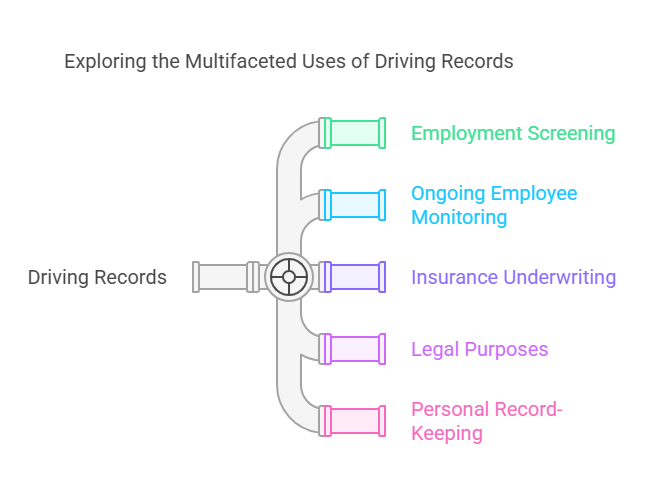
1. Pre-Employment Screening
Driving records are an essential component of background checks for positions requiring vehicle operation. Companies often assess candidates’ driving histories to:
- Identify patterns of risky behavior.
- Verify the validity of commercial driver’s licenses (CDLs).
- Ensure the safety of other employees and the public.
2. Ongoing Employee Monitoring
For organizations that employ drivers, regular checks of driving records help maintain safety standards and compliance. Monitoring records periodically can:
- Detect new violations or suspensions.
- Identify drivers who may need additional training or intervention.
- Protect the company’s reputation and reduce liability risks.
3. Insurance Underwriting and Risk Assessment
Insurers heavily rely on driving records when determining premiums and assessing risk. Key factors evaluated include:
- The number and severity of traffic violations.
- Accident history and fault determination.
- Driving behavior trends over time.
4. Legal and Court-Related Purposes
Certified Michigan driving records are often required in legal proceedings, such as:
- Contesting traffic violations or citations in court.
- Resolving disputes related to accidents or liability.
- Demonstrating compliance with court-ordered requirements.
5. Personal Record-Keeping
Individuals can use their driving records for personal reference to:
- Monitor driving habits and points.
- Verify eligibility for license reinstatement after suspension.
- Ensure accurate records for insurance or legal matters.
Best Practices for Checking Driving Records in Michigan
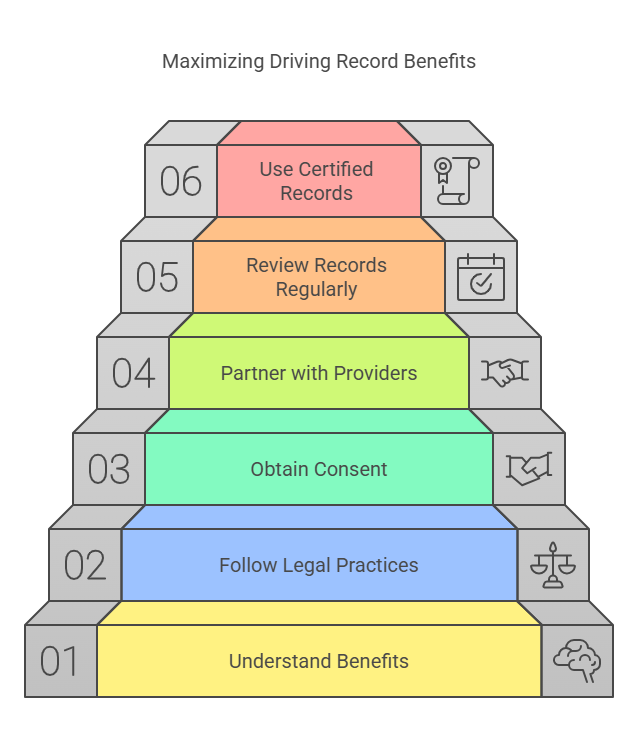
To maximize the benefits of using driving records, follow these actionable best practices:
1. Adhere to Legal Requirements
Whether you’re an individual or an employer, understanding and complying with legal requirements is crucial. Key laws to follow include:
- Driver Privacy Protection Act (DPPA): Restricts access to personal driving records without proper authorization.
- Fair Credit Reporting Act (FCRA): Regulates how employers obtain and use driving records for employment decisions.
2. Obtain Consent for Employer Checks
Employers must secure written consent from employees or job applicants before accessing their driving records. Failing to do so can result in:
- Legal penalties for non-compliance.
- Potential lawsuits or claims of privacy violations.
3. Partner with Reliable Background Check Providers
While the Michigan Department of State provides accurate records, partnering with a trusted third-party service, such as Exact Background Checks, can streamline the process. Benefits include:
- Comprehensive and customizable reports.
- Faster turnaround times for bulk requests.
- Expert guidance on legal compliance.
4. Regularly Review Records
For individuals:
- Check your record annually or after receiving a citation.
- Monitor for updates if you’ve recently contested a ticket or resolved a violation.
For employers:
- Schedule periodic checks, especially for employees operating company vehicles.
- Use alerts to track changes in driving records for high-risk roles.
5. Use Certified Records for Legal or Formal Needs
When submitting driving records for official purposes, such as court cases or job applications, always request a certified version. This ensures authenticity and credibility.
Comparison of Methods to Obtain Michigan Driving Records
| Method | Pros | Cons |
|---|---|---|
| Online | Quick, convenient, and accessible 24/7. | Requires internet access and payment. |
| In-Person | Immediate results and personal assistance. | Time-consuming; requires a visit to an SOS office. |
| By Mail | Ideal for those without online access. | Slow processing time (2–3 weeks). |
| Third-Party Service | Comprehensive, customizable, and legally compliant. | May include additional service fees. |
Example: How Employers Use Michigan Driving Records
Scenario: A Michigan-based logistics company needs to hire delivery drivers.
Steps Taken:
- The HR team requests driving records of all applicants.
- Records are reviewed for violations, suspensions, or DUI convictions.
- Candidates with clean records are prioritized.
- Periodic monitoring is implemented for hired drivers.
Outcome:
The company minimizes liability risks, ensures compliance with insurance requirements, and maintains a strong safety record.
By leveraging these best practices and understanding the practical applications of Michigan driving records, individuals and organizations can enhance safety, compliance, and financial outcomes.



